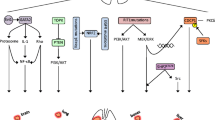Abstract
Lung cancer is the leading cause of cancer death in men and women worldwide. Since the occurrence of metastases in distant organs is the major reason for mortality of cancer patients, we need to elucidate the underlying mechanisms. Many studies featuring analysis of gene expression, comparative genomic hybridization and loss of heterozygosity analysis have been performed and generated support for the hypothesis that metastatic potential is acquired early in tumorigenesis. Furthermore, it is now clear that the majority of tumor cells have the potential to metastasize. Although many changes in gene expression profiles have been established retrospectively, translational research is now a high priority to enable clinical application and treatment based on laboratory findings.







Similar content being viewed by others
References
Brundage MD, Davies D, Mackillop WJ (2002) Prognostic factors in non-small cell lung cancer: a decade of progress. Chest 122(3):1037–1057. doi:10.1378/chest.122.3.1037
Miyoshi T, Satoh Y, Okumura S et al (2003) Early-stage lung adenocarcinomas with a micropapillary pattern, a distinct pathologic marker for a significantly poor prognosis. Am J Surg Pathol 27(1):101–109. doi:10.1097/00000478-200301000-00011
Inamura K, Shimoji T, Ninomiya H et al (2007) A metastatic signature in entire lung adenocarcinomas irrespective of morphological heterogeneity. Hum Pathol 38(5):702–709. doi:10.1016/j.humpath.2006.11.019
Garber ME, Troyanskaya OG, Schluens K et al (2001) Diversity of gene expression in adenocarcinoma of the lung. Proc Natl Acad Sci USA 98(24):13784–13789. doi:10.1073/pnas.241500798
Bhattacharjee A, Richards WG, Staunton J et al (2001) Classification of human lung carcinomas by mRNA expression profiling reveals distinct adenocarcinoma subclasses. Proc Natl Acad Sci USA 98(24):13790–13795. doi:10.1073/pnas.191502998
Beer DG, Kardia SL, Huang CC et al (2002) Gene-expression profiles predict survival of patients with lung adenocarcinoma. Nat Med 8(8):816–824
Ramaswamy S, Ross KN, Lander ES et al (2003) A molecular signature of metastasis in primary solid tumors. Nat Genet 33(1):49–54. doi:10.1038/ng1060
Liotta LA, Kohn EC (2003) Cancer’s deadly signature. Nat Genet 33(1):10–11. doi:10.1038/ng0103-10
Potti A, Mukherjee S, Petersen R et al (2006) A genomic strategy to refine prognosis in early-stage non-small-cell lung cancer. N Engl J Med 355(6):570–580. doi:10.1056/NEJMoa060467
Sun Z, Aubry MC, Deschamps C et al (2006) Histologic grade is an independent prognostic factor for survival in non-small cell lung cancer: an analysis of 5018 hospital- and 712 population-based cases. J Thoracic Cardiovasc Surg 131(5):1014–1020. doi:10.1016/j.jtcvs.2005.12.057
Inamura K, Fujiwara T, Hoshida Y et al (2005) Two subclasses of lung squamous cell carcinoma with different gene expression profiles and prognosis identified by hierarchical clustering and non-negative matrix factorization. Oncogene 24(47):7105–7113. doi:10.1038/sj.onc.1208858
Brunet JP, Tamayo P, Golub TR et al (2004) Metagenes and molecular pattern discovery using matrix factorization. Proc Natl Acad Sci USA 101(12):4164–4169. doi:10.1073/pnas.0308531101
Travis WD, Brambilla E, Muller-Hermelink HK, Harris CC (2004) World health organization classification of tumours: pathology and genetics of tumours of the lung, pleural, thymus and heart. Springer, Berlin
Jones MH, Virtanen C, Honjoh D et al (2004) Two prognostically significant subtypes of high-grade lung neuroendocrine tumours independent of small-cell and large-cell neuroendocrine carcinomas identified by gene expression profiles. Lancet 363(9411):775–781. doi:10.1016/S0140-6736(04)15693-6
Virtanen C, Ishikawa Y, Honjoh D et al (2002) Integrated classification of lung tumors and cell lines by expression profiling. Proc Natl Acad Sci USA 99(19):12357–12362. doi:10.1073/pnas.192240599
Sasatomi E, Finkelstein SD, Woods JD et al (2002) Comparison of accumulated allele loss between primary tumor and lymph node metastasis in stage II non-small cell lung carcinoma: implications for the timing of lymph node metastasis and prognostic value. Cancer Res 62(9):2681–2689
Kang Y, Siegel PM, Shu W et al (2003) A multigenic program mediating breast cancer metastasis to bone. Cancer Cell 3(6):537–549. doi:10.1016/S1535-6108(03)00132-6
Kakiuchi S, Daigo Y, Tsunoda T et al (2003) Genome-wide analysis of organ-preferential metastasis of human small cell lung cancer in mice. Mol Cancer Res 1(7):485–499
van ‘t Veer LJ, Dai H, van de Vijver MJ et al (2002) Gene expression profiling predicts clinical outcome of breast cancer. Nature 415(6871):530–536. doi:10.1038/415530a
Terasaki H, Niki T, Matsuno Y et al (2003) Lung adenocarcinoma with mixed bronchioloalveolar and invasive components: clinicopathological features, subclassification by extent of invasive foci, and immunohistochemical characterization. Am J Surg Pathol 27(7):937–951. doi:10.1097/00000478-200307000-00009
Segara D, Biankin AV, Kench JG et al (2005) Expression of HOXB2, a retinoic acid signaling target in pancreatic cancer and pancreatic intraepithelial neoplasia. Clin Cancer Res 11(9):3587–3596. doi:10.1158/1078-0432.CCR-04-1813
Kikuchi T, Daigo Y, Katagiri T et al (2003) Expression profiles of non-small cell lung cancers on cDNA microarrays: identification of genes for prediction of lymph-node metastasis and sensitivity to anti-cancer drugs. Oncogene 22(14):2192–2205. doi:10.1038/sj.onc.1206288
D’Arrigo A, Belluco C, Ambrosi A et al (2005) Metastatic transcriptional pattern revealed by gene expression profiling in primary colorectal carcinoma. Int J Cancer 115(2):256–262. doi:10.1002/ijc.20883
Xi L, Lyons-Weiler J, Coello MC et al (2005) Prediction of lymph node metastasis by analysis of gene expression profiles in primary lung adenocarcinomas. Clin Cancer Res 11(11):4128–4135. doi:10.1158/1078-0432.CCR-04-2525
Ein-Dor L, Zuk O, Domany E (2006) Thousands of samples are needed to generate a robust gene list for predicting outcome in cancer. Proc Natl Acad Sci USA 103(15):5923–5928. doi:10.1073/pnas.0601231103
Miyazaki YJ, Hamada J, Tada M et al (2002) HOXD3 enhances motility and invasiveness through the TGF-beta-dependent and -independent pathways in A549 cells. Oncogene 21(5):798–808. doi:10.1038/sj.onc.1205126
Inamura K, Togashi Y, Okui M et al (2007) HOXB2 as a novel prognostic indicator for stage I lung adenocarcinomas. J Thoracic Oncol 2(9):802–807. doi:10.1097/JTO.0b013e3181461987
Author information
Authors and Affiliations
Corresponding author
Rights and permissions
About this article
Cite this article
Inamura, K., Ishikawa, Y. Lung cancer progression and metastasis from the prognostic point of view. Clin Exp Metastasis 27, 389–397 (2010). https://doi.org/10.1007/s10585-010-9313-4
Received:
Accepted:
Published:
Issue Date:
DOI: https://doi.org/10.1007/s10585-010-9313-4




